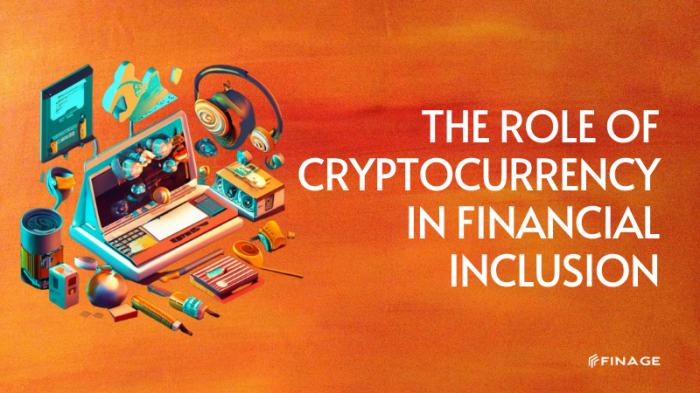How Crypto is Making Financial Services More Accessible sets the stage for a wild ride through the world of finance, where cryptocurrency is the hero breaking down barriers and opening doors to financial freedom. Get ready to dive into an exciting narrative filled with twists and turns that will leave you wanting more.
Cryptocurrency has revolutionized the way we think about traditional financial services, making them more inclusive and accessible to people worldwide. From eliminating barriers to providing cost-effective solutions, crypto is paving the way for a new era in finance.
Introduction to Crypto in Financial Services

Cryptocurrency is a digital or virtual form of currency that uses cryptography for security. It operates independently of a central authority, such as a government or bank. This decentralized nature allows for peer-to-peer transactions without the need for intermediaries.
Cryptocurrencies are transforming traditional financial services by offering lower transaction fees, faster processing times, increased security, and greater accessibility. They provide financial inclusion to individuals who may not have access to traditional banking services.
Popular Cryptocurrencies Used in Financial Services
- Bitcoin: Considered the first cryptocurrency, Bitcoin is widely accepted and used for various financial transactions.
- Ethereum: Known for its smart contract capabilities, Ethereum is used for decentralized applications and token creation.
- Ripple: Designed for fast and low-cost international money transfers, Ripple is used by banks and payment providers.
- Litecoin: Similar to Bitcoin but with faster transaction times, Litecoin is used for everyday purchases and transfers.
Accessibility of Financial Services with Crypto: How Crypto Is Making Financial Services More Accessible
Cryptocurrency is revolutionizing the way financial services are accessed around the world, making it easier for individuals to participate in the global economy.
Crypto Increasing Financial Inclusion
One of the key ways crypto is impacting accessibility is by increasing financial inclusion. Traditional banking systems often exclude individuals who lack the necessary documentation or credit history, leaving them unable to access basic financial services. Cryptocurrency, on the other hand, allows anyone with an internet connection to participate in financial transactions, regardless of their background or location.
Elimination of Barriers
Crypto eliminates barriers to accessing financial services by providing a decentralized and borderless alternative to traditional banking. With crypto, individuals can send and receive money quickly and securely without needing to rely on intermediaries or meet stringent requirements set by traditional financial institutions.
Impact on the Unbanked Population
The unbanked population, consisting of individuals who do not have access to basic financial services, is significantly impacted by the rise of crypto. Cryptocurrency provides a lifeline to the unbanked, allowing them to store value, make payments, and access financial tools that were previously out of reach. This has the potential to lift millions out of financial exclusion and empower them to participate in the global economy.
Decentralization and Security in Financial Services

Decentralization plays a crucial role in enhancing the security of financial services, especially with the emergence of blockchain technology in the crypto space. By removing the need for a central authority to control transactions, decentralized systems reduce the risk of data breaches and hacking.
Comparing Security Features
- Traditional financial systems rely on centralized databases and servers, making them vulnerable to single points of failure and cyber attacks.
- Crypto-based systems use blockchain technology, which distributes transaction data across a network of nodes, making it extremely difficult for hackers to manipulate or corrupt information.
- Blockchain’s use of cryptographic algorithms ensures that transactions are secure, transparent, and tamper-proof.
Examples of Enhanced Security
- Smart contracts on the blockchain automate and enforce the terms of agreements, reducing the risk of fraud or human error in financial transactions.
- Public and private key encryption in crypto wallets provides secure access to digital assets, minimizing the risk of unauthorized access.
- Immutable transaction records on the blockchain ensure transparency and accountability, reducing the potential for fraudulent activities in financial transactions.
Lowering Transaction Costs with Crypto

When it comes to financial transactions, one of the key advantages of using cryptocurrencies is the significant reduction in transaction fees compared to traditional banking methods.
Efficiency of Cross-Border Transactions, How Crypto is Making Financial Services More Accessible
One of the major benefits of using crypto for transactions is the efficiency it brings to cross-border payments. Traditional banking systems often involve multiple intermediaries, resulting in delays and higher fees. With cryptocurrencies, transactions can be completed faster and with lower costs, making it ideal for international transfers.
Real-World Examples of Cost Savings
Several real-world examples demonstrate the cost savings that can be achieved through crypto transactions. For instance, companies like BitPay allow merchants to accept Bitcoin payments, bypassing traditional payment processors and reducing transaction fees. Additionally, individuals can send money across borders using cryptocurrencies like Ripple, which offers faster and cheaper transactions compared to traditional methods.





